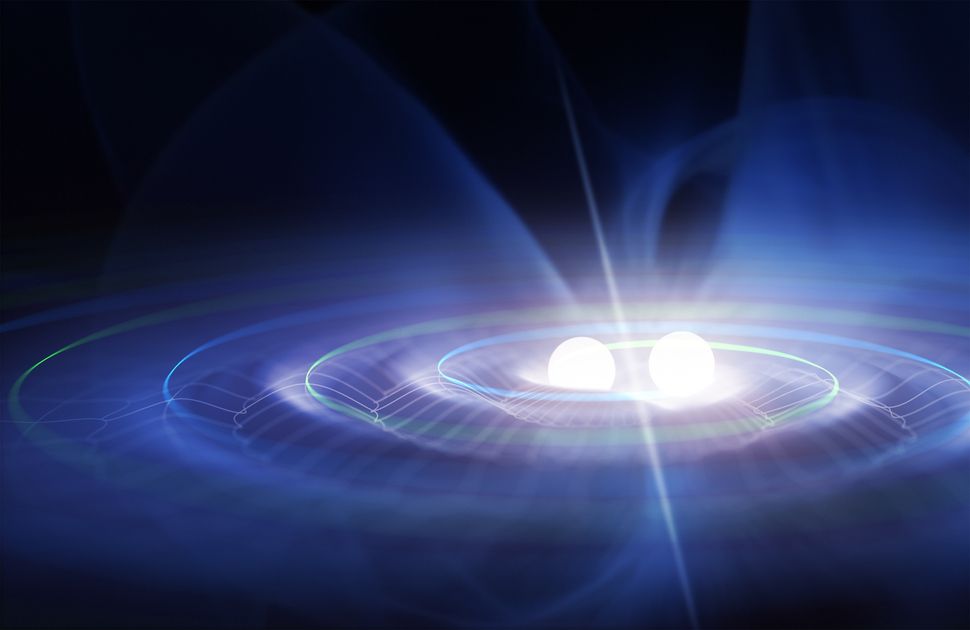Welcome to DU!
The truly grassroots left-of-center political community where regular people, not algorithms, drive the discussions and set the standards.
Join the community:
Create a free account
Support DU (and get rid of ads!):
Become a Star Member
Latest Breaking News
General Discussion
The DU Lounge
All Forums
Issue Forums
Culture Forums
Alliance Forums
Region Forums
Support Forums
Help & Search
Science
Related: About this forumThe Universe Remembers Gravitational Waves -- And We Can Find Them
By Paul Sutter - Astrophysicist 3 days ago

An artist's illustration of two black holes merging and creating ripples in spacetime known as gravitational waves.
(Image: © Shutterstock)
Gravitational waves slosh throughout the universe as ripples in space-time produced by some of the most cataclysmic events possible.
With facilities like the Laser Interferometer Gravitational-Wave Observatory (LIGO) and Virgo, we can now detect the strongest of those ripples as they wash over the Earth. But gravitational waves leave behind a memory — a permanent bend in space-time — as they pass through, and we are now on the verge of being able to detect that too, allowing us to push our understanding of gravity to the limits.
Waves of gravity
Despite the fact that it's over a century old, Einstein's theory of general relativity is our current understanding of how gravity operates. In this view, space and time are merged together into a unified framework known as (no surprises here) space-time. This space-time isn't just a fixed stage but bends and flexes in response to the presence of matter and energy.
That bending, warping and flexing of space-time then goes on to tell matter how to move. In general relativity, everything from bits of light to speeding bullets to blasting spaceships want to travel in straight lines. But the space-time around them is warped, forcing them all to follow curved trajectories — like trying to cross a mountain pass in a straight line, but following the peaks and valleys of the topography.
More:
https://www.livescience.com/universe-remembers-gravitational-waves.html
InfoView thread info, including edit history
TrashPut this thread in your Trash Can (My DU » Trash Can)
BookmarkAdd this thread to your Bookmarks (My DU » Bookmarks)
7 replies, 841 views
ShareGet links to this post and/or share on social media
AlertAlert this post for a rule violation
PowersThere are no powers you can use on this post
EditCannot edit other people's posts
ReplyReply to this post
EditCannot edit other people's posts
Rec (7)
ReplyReply to this post
7 replies
 = new reply since forum marked as read
Highlight:
NoneDon't highlight anything
5 newestHighlight 5 most recent replies
= new reply since forum marked as read
Highlight:
NoneDon't highlight anything
5 newestHighlight 5 most recent replies
The Universe Remembers Gravitational Waves -- And We Can Find Them (Original Post)
Judi Lynn
Dec 2019
OP
SonofDonald
(2,050 posts)1. Makes me wonder if they have any
Effect on our world, it is space-time rippling and can that affect our perceived world?.
Ghosts, missing time, etc...
Interesting.![]()
Salviati
(6,008 posts)2. Not any perceptable effects on the human scale
If one thinks about the mind numbingly precise machines one needs to make to detect their subtle effects. The effect the passing gravitational waves have on the 4km long arms of the LIGO interferometer change their lengths by 1/10,000 the diameter of a proton
SonofDonald
(2,050 posts)3. I've never experienced anything like I mentioned
But it makes you wonder if they have any effect, I guess it all depends on their speed is what I think.
Just another thing to add the the awesome universe.
SonofDonald
(2,050 posts)4. But yes that's pretty slow and barely detectable
FiveGoodMen
(20,018 posts)5. They should be moving at the speed of light
A gravitational wave is an invisible (yet incredibly fast) ripple in space. Gravitational waves travel at the speed of light (186,000 miles per second). These waves squeeze and stretch anything in their path as they pass by.
https://spaceplace.nasa.gov/gravitational-waves/en/
SonofDonald
(2,050 posts)6. Slow, fast, they can detect them
Good enough for me.
caraher
(6,278 posts)7. The "memory" effect they speak of is currently undetectably small
The research paper cited has the following abstract (bold added by me, italics to fix an issue with a character DU can't seem to handle)
Gravitational-wave memory, a strong-field effect of general relativity, manifests itself as a permanent displacement in spacetime. We develop a Bayesian framework to detect gravitational-wave memory with the Advanced LIGO/Virgo detector network. We apply this algorithm on the ten binary black hole mergers in LIGO/Virgo's first transient gravitational-wave catalog. We find no evidence of memory, which is consistent with expectations. In order to estimate when memory will be detected, we use the best current population estimates to construct a realistic sample of binary black hole observations for LIGO/Virgo at design sensitivity. We show that an ensemble of (roughly 2000) binary black hole observations can be used to find definitive evidence for gravitational-wave memory. We conclude that memory is likely to be detected in the early A+/Virgo+ era.
So it will take substantially improved detectors to confirm this prediction. Which means that we're not going to be personally making an impression on the universe, worth mentioning, via this mechanism